【外研版】七上 Module9 Unit3 Language in use 习题课件
文档属性
| 名称 | 【外研版】七上 Module9 Unit3 Language in use 习题课件 | 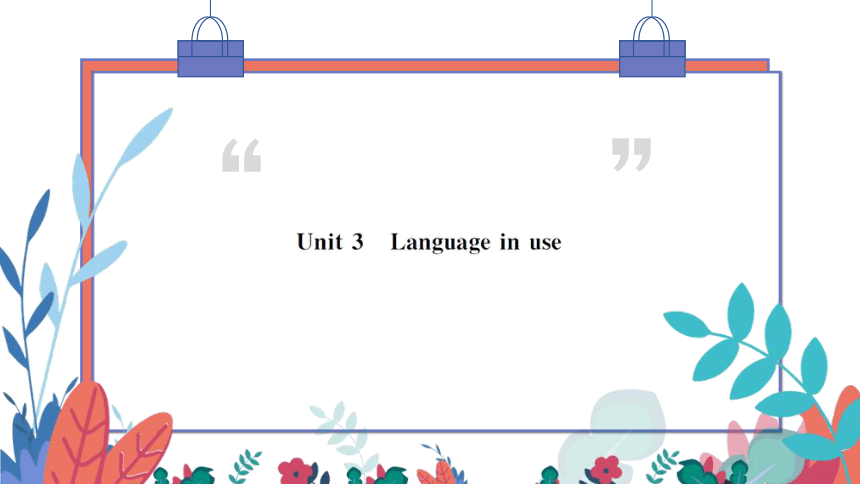 | |
| 格式 | pptx | ||
| 文件大小 | 3.0MB | ||
| 资源类型 | 试卷 | ||
| 版本资源 | 外研版 | ||
| 科目 | 英语 | ||
| 更新时间 | 2021-12-07 09:24:32 | ||
图片预览


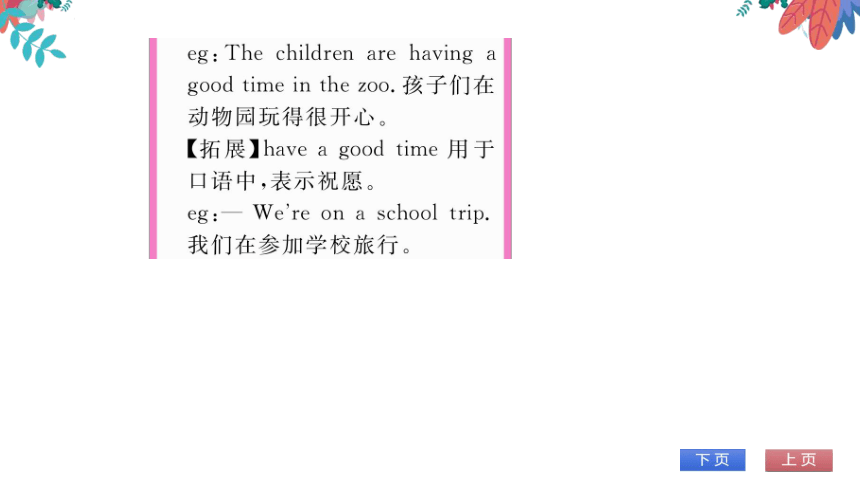
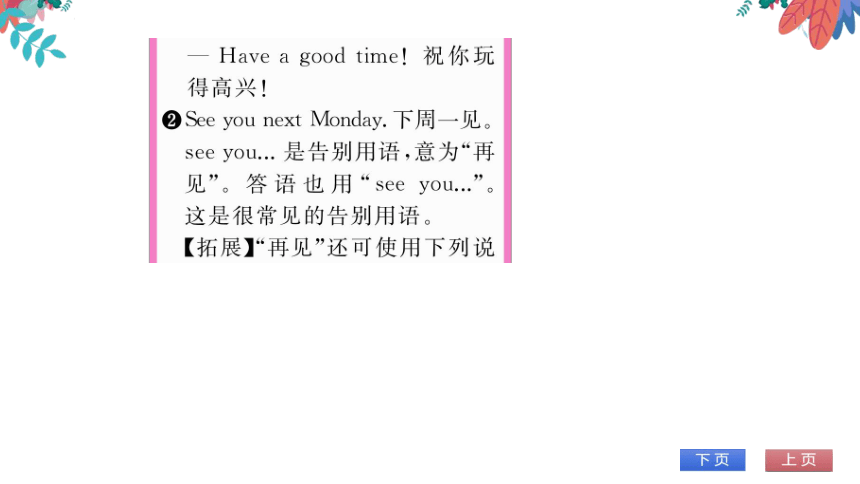
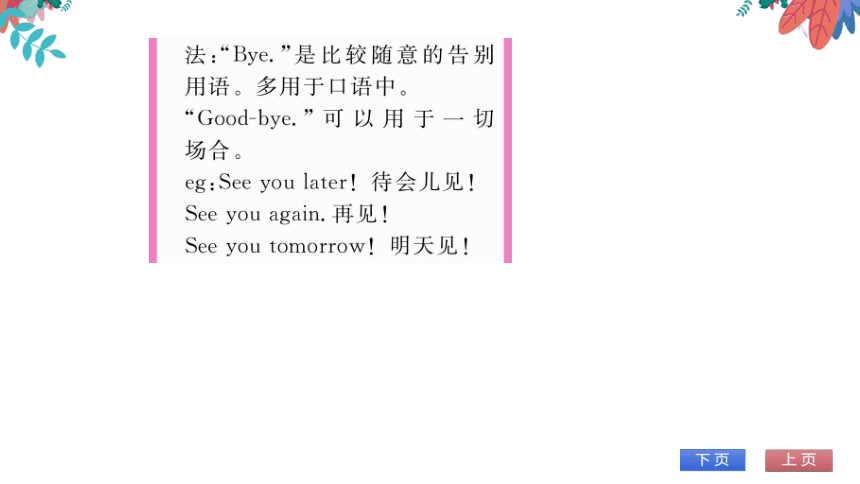
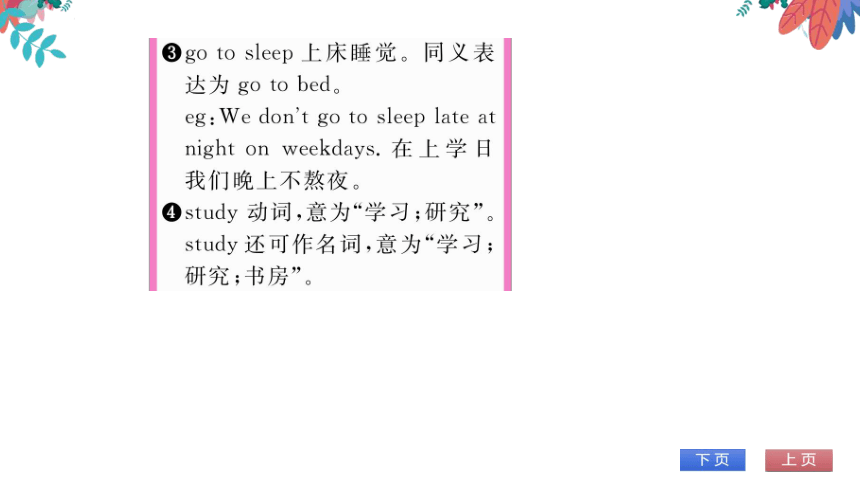
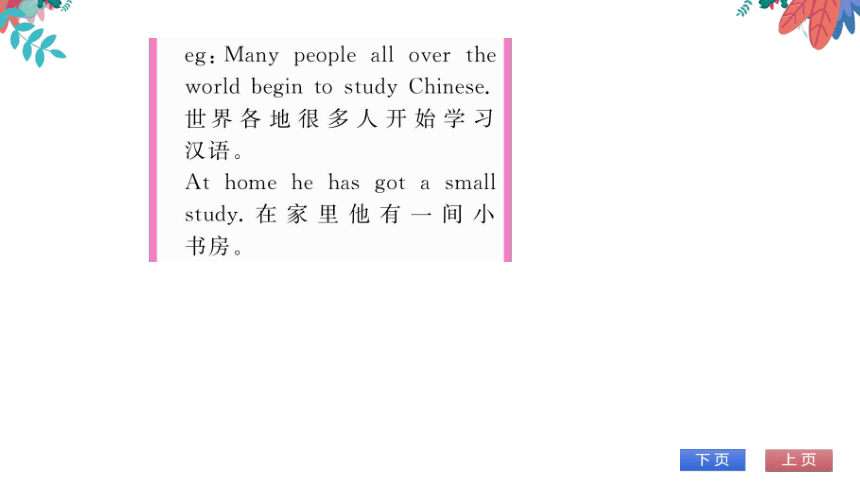
文档简介
(共15张PPT)
名师详运
1 Are you having a good time
你们玩得高兴吗
have a good time意为“玩得高
兴”,其中的good可以换为
great, wonderful等形容词;意
义同 enjoy oneself
eg: The children are having a
good time in the zoo.孩子们在
动物园玩得很开心。
【拓展】 have a good time用于
口语中,表示祝愿。
eg:- Were on a school trip
我们在参加学校旅行
Have a good time!祝你玩
得高兴!
② See you next monday.下周一见
see you
是告别用语,意为“再
见”。答语也用“ see you
这是很常见的告别用语
【拓展】“再见”还可使用下列说
法:“Bye.”是比较随意的告别
用语。多用于口语中
Good-bye.”可以用于一切
eg: See you later!待会儿见
See you again.再见
ee you tomorrow!明天见!
3go to sleep
上床睡觉。同义表
达为 go to bed。
eg We don't go to sleep late at
night on weekdays.在上学
我们晚上不熬夜。
④ study动词,意为“学习;研究”
study还可作名词,意为“学习;
研究;书房
eg Many people all over the
world begin to study Chinese
世界各地很多人开始学习
汉语。
At home he has got a small
study.在家里他有一间小
书房。
【拓展】辨析 study与 learn
(1) study侧重于深度研究及系
统地学习,强调主观上努力学
习的动作或过程
eg: Mr black studies chinese in
the university.布莱克先生在
大学研究中文
(2) learn多指初学阶段或模仿
性的技术操作,更强调学习的
结果
eg: They learn to s win.他们
习游泳
用方框中所给短语的适当形式填空。
leave work get off, visit friends, wait for, at the moment
1. My friend jim is waiting for me in the park
2. At the moment Daming is watching Tv
3. In New York, it's afternoon. Many people are visiting friends or shopping
4. Jenny is leaving work and going home now.
5. Miss White is getting off the train with her luggage(n2)
名师详运
1 Are you having a good time
你们玩得高兴吗
have a good time意为“玩得高
兴”,其中的good可以换为
great, wonderful等形容词;意
义同 enjoy oneself
eg: The children are having a
good time in the zoo.孩子们在
动物园玩得很开心。
【拓展】 have a good time用于
口语中,表示祝愿。
eg:- Were on a school trip
我们在参加学校旅行
Have a good time!祝你玩
得高兴!
② See you next monday.下周一见
see you
是告别用语,意为“再
见”。答语也用“ see you
这是很常见的告别用语
【拓展】“再见”还可使用下列说
法:“Bye.”是比较随意的告别
用语。多用于口语中
Good-bye.”可以用于一切
eg: See you later!待会儿见
See you again.再见
ee you tomorrow!明天见!
3go to sleep
上床睡觉。同义表
达为 go to bed。
eg We don't go to sleep late at
night on weekdays.在上学
我们晚上不熬夜。
④ study动词,意为“学习;研究”
study还可作名词,意为“学习;
研究;书房
eg Many people all over the
world begin to study Chinese
世界各地很多人开始学习
汉语。
At home he has got a small
study.在家里他有一间小
书房。
【拓展】辨析 study与 learn
(1) study侧重于深度研究及系
统地学习,强调主观上努力学
习的动作或过程
eg: Mr black studies chinese in
the university.布莱克先生在
大学研究中文
(2) learn多指初学阶段或模仿
性的技术操作,更强调学习的
结果
eg: They learn to s win.他们
习游泳
用方框中所给短语的适当形式填空。
leave work get off, visit friends, wait for, at the moment
1. My friend jim is waiting for me in the park
2. At the moment Daming is watching Tv
3. In New York, it's afternoon. Many people are visiting friends or shopping
4. Jenny is leaving work and going home now.
5. Miss White is getting off the train with her luggage(n2)
同课章节目录
- Starte
- Module 1 My teacher and my friends
- Module 2 My English lesson
- Module 3 My English book
- Module 4 My everyday life
- Module 1 My classmates
- Unit 1 Nice to meet you.
- Unit 2 I'm Wang Lingling and I'm thirteen years ol
- Unit 3 Language in use.
- Module 2 My family
- Unit 1 Is this your mum?
- Unit 2 These are my parents.
- Unit 3 Language in use.
- Module 3 My school
- Unit 1 There are thirty students in my class.
- Unit 2 The library is on the left of the playgroun
- Unit 3 Language in use.
- Module 4 Healthy food
- Unit 1 We've got lots of apples.
- Unit 2 Is your food and drink healthy?
- Unit 3 Language in use.
- Module 5 My school day
- Unit 1 I love history.
- Unit 2 We start work at nine o'clock.
- Unit 3 Language in use.
- Revision module A
- Module 6 A trip to the zoo
- Unit 1 Does it eat meat?
- Unit 2 The tiger lives in Asia.
- Unit 3 Language in use.
- Module 7 Computers
- Unit 1 How do I write my homework on the computer?
- Unit 2 When do you use a computer?
- Unit 3 Language in use.
- Module 8 Choosing presents
- Unit 1 I always like birthday parties.
- Unit 2 She often goes to concerts.
- Unit 3 Language in use.
- Module 9 People and places
- Unit 1 We're enjoying the school trip a lot.
- Unit 2 They're waiting for buses or trains.
- Unit 3 Language in use.
- Module 10 Spring Festival
- Unit 1 Are you getting ready for Spring Festival?
- Unit 2 My mother's cleaning our houses and sweepin
- Unit 3 Language in use.
- Revision module B
